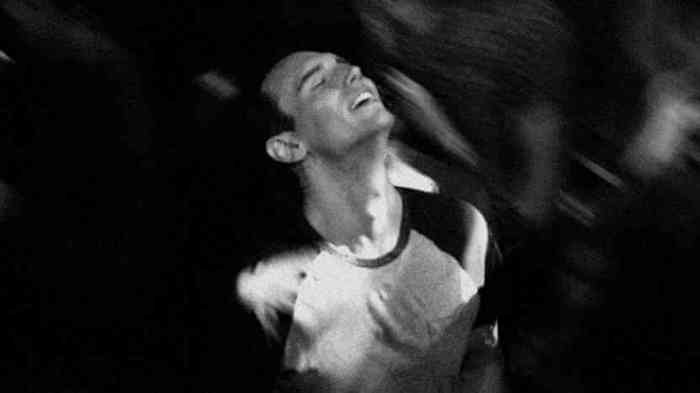Keilly McQuail and Michael Labbadia in Preston Sturges’ “Strictly Dishonorable,” at the Flea through August 10. | LEAH CADDIGAN
No one wrote women better than Preston Sturges.
Whether it was delectable Nancy Carroll’s Brooklyn dance hall hostess who winds up on Park Avenue in “Child of Manhattan”; the dual role of princess and commoner that Sylvia Sidney, given a glorious reprise from tenement weepers, played in the charming “Thirty Day Princess”; the most adorable of gamine waifs, Luisa Gingelbusher, as enchantingly portrayed by husky/ wistful-voiced Margaret Sullavan in his adaptation of Ferenc Molnár’s “The Good Fairy”; Jean Arthur’s impoverished, slightly dizzy but somehow completely commonsensical screwball heroine in “Easy Living,” who falls into the lap of luxury; or Barbara Stanwyck’s shoplifter redeemed by the love of Fred MacMurray and the Indiana simple life in “Remember the Night,” Sturges drew full-scale, nuanced, and funny female characters, and these were just the screenplays he wrote.
Starting in 1940, he began an incredible eight-year-run as a brilliant director-writer, producing vehicles for actresses as deliciously diverse as Stanwyck, Veronica Lake, Claudette Colbert, Betty Hutton, and Linda Darnell, each of them a masterpiece in its own right, being, respectively, “The Lady Eve,” “Sullivan’s Travels,” “The Palm Beach Story,” “The Miracle of Morgan’s Creek,” and “Unfaithfully Yours.”
Newfest highlights include high-flying “Blackbird”; classic Hollywood melodrama super-sized
It really all began with his 1929 Broadway hit “Strictly Dishonorable,” written in just six days and co-directed by Antoinette Perry (for whom the Tony award was named), which ran for 16 months, earning him some $300,000. It was made into a film by Universal in 1931— with a newly arrived Bette Davis dying to play the lead, which instead went to the untalented, suicidal starlet Sidney Fox. In it, Sturges created the lovable character of Isabelle Parry, a very innocent but savvy — as a lot of his heroines were — Southern almost-belle who is torn between her love for a stuffy guy from West Orange, New Jersey, and a glamorous opera star she encounters one drunken night in a speakeasy.
Although “Strictly Dishonorable” was remade into a 1951 MGM film with Ezio Pinza and Janet Leigh, the play has really fallen into obscurity. So it is truly cause for celebration that the Attic Theater Company has given it a luminous revival at the Flea Theater (41 White St., btwn. Broadway & Church St., through Aug. 10; theflea.org). Under the sparklingly spot-on direction of Laura Braza, Sturges’ joyous vision of struggling young love in a bygone, booze-soaked Manhattan comes to bracing life in a production that is near-perfect down to its smallest details of Jazz Age set design, costume, and cocktail mixology.
Michael Labbadia as the opera singer is sexy, brash, and ardent, and the fact that he resembles the young Vince Edwards is a definite plus, along with his plangent singing voice. He has a magical chemistry with Keilly McQuail, who is nothing short of inspired as Isabelle, adorably original in every conceivable way. They are both very young — it’s 22-year-old Labbadia’s New York debut — and not that seriously schooled in screwball comedy, with McQuail confessing to me at the after-party that she had never even seen a Sturges film. It makes absolutely no difference, however, for their very youth and the ineffable gifts that only truly talented actors have — the kind which makes you love them onstage — are all they need to so beautifully put this supremely satisfying show over.
Gemze de Lappe and Wakefield Poole at the NewFest screening of “I Always Said Yes: The Many Lives of Wakefield Poole.” | DAVID NOH
The NewFest has really settled into its wonderfully convenient home at Lincoln Center’s Walter Reade Theater, and there were a number of gems in its schedule. The opening night film, Karim Ainouz’s “Futuro Beach” was a disappointment, though, too self-consciously arty and oh-so slow, with nothing much really happening. It’s the kind of lazy, emptily portentous queer film that posits two supposedly irresistibly attractive studs with the assumption that anything they do — lots of silent moping, teasing bits of nudity, and sudden dancing fits — is automatically fascinating to us pining gays in the dark.
“Blackbird,” however, was a wondrous revelation. I was never a big fan of director Patrik-Ian Polk’s “Noah’s Arc” series, but this film evinced a new storytelling strength, deeper humanity, gritty wit, and striking visuals, with something of Lee Daniels’ audacity. Transposing Larry Duplechan’s novel about an alienated black teen from all-white Los Angeles to all-black Hattiesburg, Mississippi, Polk limns a deeply moving coming of age saga, centering around the engaging friendship of four misfits — Randy (Julian Walker, doing the questioning thing), hunky Todd (Torrey Laamar, straight and Randy’s unrequited lust object), Leslie (Wanita Woodgett, straight and a proud, strong virgin), and Efram (terrific Gary LeRoi Gray, definitely gay). Adding vividly strong performances were Isaiah Washington and Mo’Nique, as Randy’s parents.
At the Q&A, I asked Polk about Washington’s somewhat surprising involvement here, given his media-reported history of homophobia on the set of “Grey’s Anatomy,” which supposedly caused gay co-actor T.R. Knight to quit the show. A peeved Polk completely dismissed these charges, saying the media blew all out of proportion a private conversation Washington was having with another actor, with Knight not even present. He added that Washington is anything but a homophobe, had played gay in Spike Lee’s “Get On the Bus” years before when “no one was doing that,” and was one of his favorite actors for whom he wrote the part. Polk also said that it was Washington who sent Mo’Nique the script, which she agreed to do, playing another monster mom, somewhat less horrific than her “Precious” character.
Andrea James’ “Baby Daddy” focused on Filipino actor Alec Mapa, the self-dubbed “America’s Gaysian Sweetheart,” in a stand-up gig he performed at LA’s gay center and his adoption with his husband of a five-year-old black boy from Compton, California. His comedy is convulsingly funny, touching on subjects like gay porn and rough sex (“I’m so vanilla, my safe word is ‘Ow’”), and, movingly, his choice to adopt a really needy child. Black boys are the least desirable in the adoptive world, and Mapa’s decision to do this, instead of fertilizing his seed to bring yet another life into this overpopulated world, I find highly commendable.
Kate Kunath and Sasha Wortzel’s documentary, “We Came to Sweat: The Legend of Starlite,” was about the demise of Brooklyn’s oldest gay bar, the Starlite Lounge, which shuttered in 2010 after 48 years in business. Despite intense efforts to battle its eviction by its owner, staff, and the Crown Heights community, gentrification won the day once more, and the film is a touching testament to one more historic New York gay landmark, the likes of which will never be seen again.
“I Always Said Yes: The Many Lives of Wakefield Poole” had a special screening at the Jewish Community Center, with Poole himself in attendance, along with friends like Gemze de Lappe, the great dancer-choreographer. “Many lives” is almost an understatement here for Poole started as a dancer with the Ballets Russes, transitioned to Broadway where he worked with the likes of Stephen Sondheim and Richard Rodgers, and then turned to filmmaking.
And what filmmaking! His 1971 “The Boys in the Sand” was the first legitimate feature-length gay porn film, a cultural phenomenon he followed with the equally successful “Bijou.” After that, he moved from New York to San Francisco, where he opened a highly influential store and salon on Castro Street during the height of the post-Stonewall/ Harvey Milk (a personal friend) era. A period of serious cocaine abuse occurred after that, but Poole cleaned up his act, became a gourmet chef, and worked for years for Calvin Klein. Whew! I’m exhausted from all that, but Poole, who’s relocated to his native Jacksonville, remains as eternally youthful, energetic, and creative as ever.
The Museum of the Moving Image is continuing its wonderful “See It Big!” series through Aug. 31, now focusing on Hollywood melodrama (36-01 35th Ave., Astoria, movingimage.us). Some real classics of the genre are included, and no matter how many times you’ve seen them, nothing beats the thrill and chances for new discoveries when they unspool on a movie screen.
My personal picks include Bette Davis’ finest pure drama, William Wyler’s adaptation of Maugham’s brilliant “The Letter” (Aug. 24, 3 p.m.), if only to really experience Tony Gaudio’s velvety cinematography which reaches its apex in the delirious confrontation between Davis’ smoldering volatility and Gale Sondergaard’s smoldering inscrutability. Max Ophuls’ “Letter from an Unknown Woman” (Aug. 24, 5:30 p.m.) is the most beautiful Hollywood romance ever filmed, with Joan Fontaine’s greatest performance, from a book by the now chic Stefan Zweig, whom I’ve read since childhood. “Portrait of Jennie” (Aug. 30, 3 p.m.), a swoony exercise in l’amour fou with the ever otherworldly Jennifer Jones at her most exquisite, spins itself out to the music of Debussy and genius Lee Garmes’ surreal camerawork, which captures a glitteringly crisp post-World War II Manhattan winter of one’s dreams.
The 1959 Douglas Sirk “Imitation of Life” (Aug. 17, 5:30 p.m.) is pretty regularly revived, so it’s nice that they’re also screening the 1934 John Stahl version (Aug. 17, 2:30 p.m.). It’s shorter and much less soapy, focusing more on the Depression-affected working career of its businesswoman lead played by Claudette Colbert, at her most beautiful, wearing a to-die wardrobe by Robert Kalloch. There’s also much less of the story of her black maid and troubled mulatto daughter who’s trying to pass as white, but this is somewhat redeemed by the fact that the daughter is played by the gorgeous part-black actress Fredi Washington, who was a pioneering advocate for civil rights in real life.
Contact David Noh at Inthenoh@aol.com, follow him on Twitter @in_the_noh, and check out his blog at http://nohway.wordpress.com/.



































